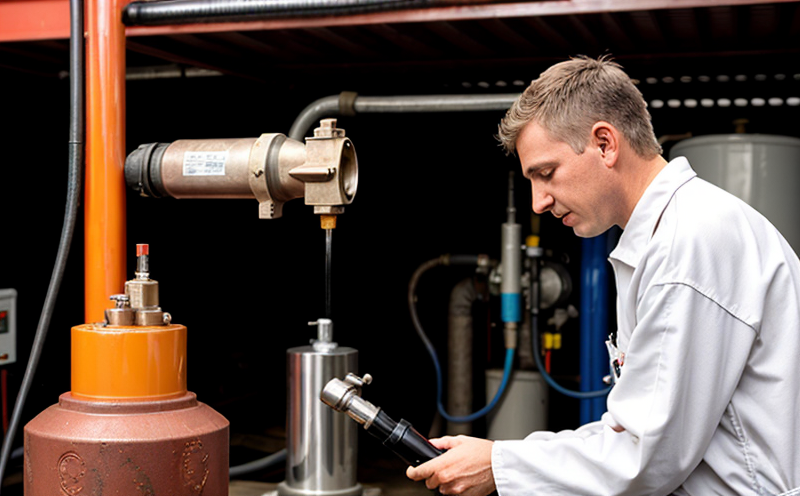ASTM D381 Jet Fuel Oxidation Stability Testing
The ASTM D381 standard defines a method used to evaluate the resistance of jet fuel to oxidative degradation. This is critical in ensuring that fuels meet performance standards and remain stable under operational conditions, which can vary widely depending on environmental factors such as temperature, humidity, and storage duration.
Jet fuel, especially for aircraft operations, must undergo rigorous testing to ensure it remains free from harmful compounds that can lead to engine malfunctions or failure. Oxidation is one of the primary concerns in aviation fuels because it can form deposits within engines leading to reduced efficiency and increased maintenance costs over time.
The ASTM D381 test involves heating a sample of jet fuel under controlled conditions to promote oxidation, then measuring the formation of peroxides and other degradation products. The results provide insight into how well the fuel will perform during storage and use in engines. This information is vital for manufacturers and operators alike as they strive to maintain high standards of safety and reliability.
For compliance purposes, this test is often required by aviation authorities worldwide, making it essential for companies involved in the supply chain—from raw material acquisition through final product delivery. By adhering to these stringent requirements, businesses can ensure their products meet international standards while also reducing potential risks associated with substandard fuels.
The ASTM D381 method provides a standardized approach that allows laboratories to consistently assess fuel quality across different batches and locations. This consistency is crucial for both internal quality control processes within organizations as well as external audits by regulatory bodies. With accurate results, stakeholders can make informed decisions regarding fuel procurement and usage practices.
In summary, ASTM D381 jet fuel oxidation stability testing plays a pivotal role in maintaining the integrity of aviation fuels, thereby enhancing overall operational safety and efficiency. It helps identify potential issues early on so that corrective actions can be taken before they become critical problems. Understanding this process enables industry professionals to better manage their resources effectively and contribute positively towards sustainable practices within the sector.
Scope and Methodology
| Step | Description |
|---|---|
| Sample Preparation | The sample must be representative of the fuel batch being tested. It should be free from contamination, stored at appropriate temperatures prior to testing. |
| Heating and Oxidation | The prepared sample is heated in an oxygenated environment for a specified period under controlled conditions designed to simulate real-world storage scenarios. |
| Monitoring Peroxide Formation | During the heating process, the formation of peroxides (indicative of oxidation) is continuously monitored using specialized analytical techniques. |
| Data Analysis | The data collected during monitoring is analyzed to determine the extent of oxidation and compare it against established limits outlined in ASTM D381. |
| Reporting Results | A detailed report is generated summarizing the findings, including any deviations from acceptable levels and recommendations for corrective measures if necessary. |
This table outlines key steps involved in performing ASTM D381 jet fuel oxidation stability testing. Each step plays a crucial role in ensuring accurate results that reflect true conditions experienced by fuels during storage and usage.
Benefits
Conducting ASTM D381 jet fuel oxidation stability tests offers numerous advantages to various stakeholders within the aerospace and aviation industries. For quality managers, it provides valuable insights into potential issues early on, allowing for timely interventions that prevent costly downtime or repairs later down the line.
Compliance officers benefit greatly from this testing as they can ensure their products meet all relevant regulatory requirements set forth by aviation authorities. This not only protects them against legal penalties but also enhances their reputation among clients and partners who value adherence to international standards.
R&D engineers find ASTM D381 particularly useful for developing new formulations that could improve fuel stability while meeting stringent performance criteria. By continuously monitoring changes introduced during development phases, they can optimize their products more efficiently.
For procurement teams responsible for sourcing raw materials and final products, this test ensures they are purchasing only high-quality fuels from reliable suppliers. This reduces the risk of receiving substandard goods that could negatively impact operations or even cause operational disruptions.
In summary, ASTM D381 jet fuel oxidation stability testing serves multiple purposes beyond mere compliance checks; it contributes significantly to maintaining safety standards, optimizing product performance, and promoting sustainable practices within the industry.





